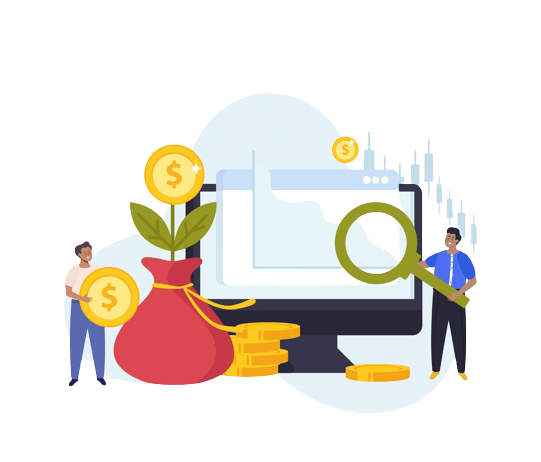Search Engine Marketing (SEM)
Optimizing Ad Strategies for Conversions Can Lead to Above-the-Fold Ranking
Home >> Digital Marketing Agency >> Search Engine Marketing (SEM)
Millions of prospective consumers will discover you online if you take control of the content that displays above-the-fold (ATF) in relevant search results. Start your search engine marketing strategy right now with the assistance of Resources Utility Digital Marketing Agency, your go-to source for SEO in Pakistan.
What SEM Is and Why It Represents a Valuable Investment
Defeat your rivals and grow your business.
Websites are marketed via the use of paid advertising employing the efficient digital marketing strategy known as search engine marketing (SEM), which involves increasing their visibility in search engine results pages (SERPs).
Pay-per-click (PPC) campaigns used for SEM often include marketers bidding on certain keywords related to their target market. When people type such terms, advertisements that show at the top or bottom of search results cause a targeted audience to visit the website.

Due to its quick effects and capacity to contact prospective clients who are actively looking for connected goods or services, SEM is a very profitable investment for companies. SEM provides a speedier approach to get seen and draw in high-quality leads than organic search techniques. SEM campaigns are also very quantitative, allowing businesses to track the success of their advertising and alter their strategies in real-time for better results.
Businesses may improve their online presence, raise brand recognition, and ultimately generate more conversions by investing money to SEM, making it a necessary and valuable investment in the cutthroat digital environment.
What do search engines refer to?
Users may locate information on the internet by using search engines, which are online resources. They index web pages and provide relevant results based on user queries. Well-known search engines include Google, Bing, and Yahoo. When users enter keywords or phrases, a list of webpages, photos, videos, or other information relevant to the query is returned by the search engine.
Three main tasks are carried out by search engines:
Indexing: This process gathers and arranges data from web pages to produce a searchable database.
Ranking: They examine and assess the indexed material to ascertain its applicability to certain search terms.
Retrieval: Search engines extract and present the most relevant results from their indexed database when users input a query.

0
%
Google
0
%
Bing
0
%
Yahoo
0
%
Baidu
0
%
DuckDuckGo
0
%
Yandex
What Is Search Engine Marketing?

Websites are marketed utilizing the search engine marketing (SEM) digital marketing approach, which increases their visibility in search engine results pages (SERPs) through paid advertising. When people search for certain goods or services, advertisers place bids on particular keywords that they could type in.
When a user’s search contains the targeted keywords, the advertiser’s ad appears at the top or bottom of the search results.
The main component of SEM is pay-per-click (PPC) advertising, where advertisers receive payment for every click on their ad.Utilizing search engines like Google and Bing is a very efficient approach to increase brand recognition, attract targeted visitors to websites, and produce leads or sales.
SEM, a Pay-Per-Click (PPC) advertising approach, strives to enhance your website’s visibility on search engine results pages (SERPs) and establish relationships with prospective customers during their online purchasing journey. Our SEM specialists proactively bid on keywords to boost traffic and conversions to your landing pages while enhancing the effectiveness of your ads and raising your Quality Score. Your sponsored search advertising’ relevance and quality are evaluated by the Quality Score, a crucial indicator for search engines. Search engines lower your expenses for ad clicks and conversions by successfully matching the demands of your audience, making SEM an effective strategy to increase online visibility and improve consumer engagement.
How does SEM operate?
Online adverts are shown on search engine result pages as part of search engine marketing, or SEM.Advertisers submit bids on keywords that are associated with their products or services. The adverts are prominently shown when people search for certain terms, increasing the probability that consumers will click them. Every time an advertiser’s ad is clicked, potentially engaging a consumer, the search engine receives payment from the advertiser.
Is PPC search engine marketing necessary for my business?
Your unique objectives, target market, and financial constraints will determine if PPC (Pay-Per-Click) search engine marketing is necessary for your organization. PPC has several advantages, including instant search engine prominence, increased website traffic, and accurate audience targeting. Businesses looking to swiftly enhance their web presence, generate leads, or advertise time-sensitive specials may find it very helpful.
However, a sound plan and management are essential to its efficacy. PPC may be a crucial tool to improve your online visibility and draw in prospective clients if your objective is quick, quantifiable results and you have the funds to spend in online advertising.

Better Brand Recognition
By prominently displaying advertisements in search engine results, search engine marketing (SEM) helps brands become more well-known. SEM makes sure that your business is at the top of searches for relevant keywords, improving awareness. Consistent exposure increases brand familiarity, which increases user trust and engagement with your company, eventually boosting brand awareness.
Increased Conversion
By showing customized adverts to consumers who are actively looking for certain goods or services, search engine marketing (SEM) increases conversions. These advertisements show up at the ideal time, identifying users' intentions and guiding them to relevant landing sites. This accuracy guarantees a greater chance of conversion, resulting in more beneficial encounters and possible revenues for companies.
Specific Targeting
SEM (Search Engine Marketing) excels in accurate targeting, enabling companies to precisely target their ideal demographic with advertisements. Advertisers may target consumers based on keywords, geography, demographics, and even online activity via platforms like Google Ads. With such exactitude, marketing initiatives are focused on the most appropriate target, increasing engagement and conversion rates.
Greater Campaign Control
SEM (search engine marketing) gives marketers more campaign control. Businesses have exact control over their ad budgets, targeting choices, and ad timing thanks to SEM platforms like Google Ads. Due to their ability to change settings in real-time to improve efficacy and accomplish particular marketing objectives, firms are able to optimize their campaigns.
Measurable Growth
Businesses might see quantifiable growth thanks to search engine marketing (SEM). Advertisers may monitor important data like clicks, conversions, and return on investment (ROI) using SEM platforms like Google Ads. Businesses may evaluate campaign effectiveness, make data-supported choices, and optimize tactics using this data-driven strategy, resulting in continual improvement and quantifiable company development.
Improved Organic Traffic
Search engine marketing (SEM) is used to boost a website's visibility in search engine results pages (SERPs). Businesses may quickly increase traffic to their websites with paid search advertising while simultaneously improving their organic search results. Higher organic click-through rates may result from the improved exposure and traffic, which will eventually improve organic traffic over time.
What distinguishes SEO, PPC, and SEM from each other?
Gain command over your advertising initiatives
- Search Engine Optimization: The goal of SEO, or search engine optimization, is to make websites more visible in organic (unpaid) search engine results. It involves a range of strategies such as building backlinks, optimizing content, and conducting keyword research.Through improving a website’s relevance and authority, SEO hopes to gradually increase organic traffic.
- Pay-Per-Click: Companies utilizing the PPC (pay-per-click) advertising method incur charges for every click their ad receives. It’s a component of SEM, or search engine marketing, a more general phrase that includes both paid and organic techniques to increase online presence. In search engine results, PPC ads bearing the designation “sponsored” are displayed first. Advertisers place bids on keywords that are relevant to their target market to guarantee that their ads appear right away when customers search for such phrases.
- Search Engine Marketing: Thus, SEM encompasses both SEO and PPC strategies. PPC offers immediate exposure and traffic, but SEO focuses on organic rankings and long-term development. This difference enables marketers to efficiently manage their campaigns and budgets. SEM combines the effectiveness of these tactics and provides a comprehensive strategy for enhancing a website’s online visibility.
Is Both SEM and SEO Necessary?
Enhance Your Online Presence with Complete Search Engine Visibility Solutions

Your unique marketing objectives, as well as your budget, will determine if Search Engine Marketing (SEM) and Search Engine Optimization (SEO) are required.
Like PPC campaigns, SEM uses paid advertising to provide quick presence on search engines. Businesses looking for rapid results or those operating in very competitive markets can benefit from it.
You can effectively target your audience and display your ads to the appropriate individuals at the ideal moment by employing precise audience targeting through SEM. It does, however, demand money, and visibility ends if you stop buying advertisements.
On the other hand, SEO focuses on natural methods to increase the visibility of your website in search results. It entails optimizing your website, producing high-quality content, and constructing backlinks with the goal of achieving steady, long-term development. The traffic produced through SEO is organic and long-lasting, albeit it takes time to see any noticeable benefits. In contrast to SEM, SEO doesn’t need ongoing fees for exposure, which makes it more affordable over time.
SEM Services
Boost Your Advertising Campaigns for Positive Outcomes
Keyword Research and Strategy
Strategic planning and thorough keyword research are both part of SEM services. Experienced professionals look at search trends, competition, and user behavior to uncover high-performing keywords. These insights help organizations reach their target audience efficiently, increase clicks, and improve their online exposure, which in turn generates profitable traffic and transactions.
Social Media Paid Advertising
SEM services include sponsored social media advertising, which is a calculated move to attract a larger audience. Businesses may use websites like Facebook, Instagram, and LinkedIn to target certain demographics, interests, and habits. To ensure optimum exposure and engagement, SEM experts create captivating advertising. This increases website traffic, leads to more conversions, and raises brand recognition.
Landing Page Conversion
Increasing landing page conversion rates is the major objective of SEM services. Professionals create attractive landing pages that persuade users to do desired activities, such completing a purchase or filling out a form, using data-driven tactics. SEM specialists optimize conversions by boosting user experience and relevancy, ensuring that companies get the most out of their online efforts.
Paid Search Advertising
SEM (search engine marketing) gives marketers more campaign control. Businesses have exact control over their ad budgets, targeting choices, and ad timing thanks to SEM platforms like Google Ads. Due to their ability to change settings in real-time to improve efficacy and accomplish particular marketing objectives, firms are able to optimize their campaigns.
Ads A/B Split Testing
Ads A/B split testing is a key tactic for enhancing ad performance and is included in SEM. To find the one that connects with the audience the most effectively, experts test many ad variants. SEM specialists fine-tune ad components via thorough research to ensure maximum efficacy, increased click-through rates, and greater conversion rates, thus boosting total campaign performance.
SEM PPC Management
SEM include administration of SEM PPC (Pay-Per-Click), a critical component of internet advertising. Professionals are skilled in managing PPC campaigns, including bid management, performance tracking, and keyword selection and ad development. SEM professionals make sure organizations receive the highest returns on investment by optimizing advertising and budgets, which drives targeted traffic and conversions.
Remarketing
Remarketing techniques are part of SEM and are used to re-engage website visitors who did not convert. Businesses keep top-of-mind by displaying relevant adverts to these visitors while they explore other websites, improving the possibility of conversions. SEM professionals optimize remarketing programs to maximize ROI and increase overall conversion rates.
Search Engine Optimization
To increase organic exposure, search engine optimization (SEO) is frequently used into SEM. SEM experts optimize website content, enhance site architecture, and build high-quality backlinks to raise a website's search engine rating. Together, SEO and paid advertising provide a holistic online presence that maximizes impact and conversions by generating both organic and sponsored visitors.

